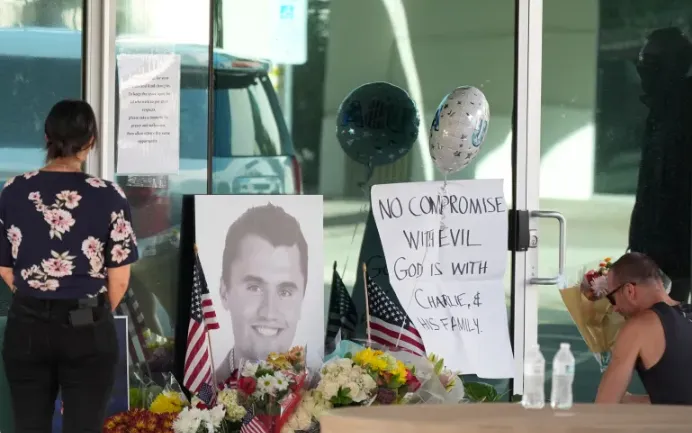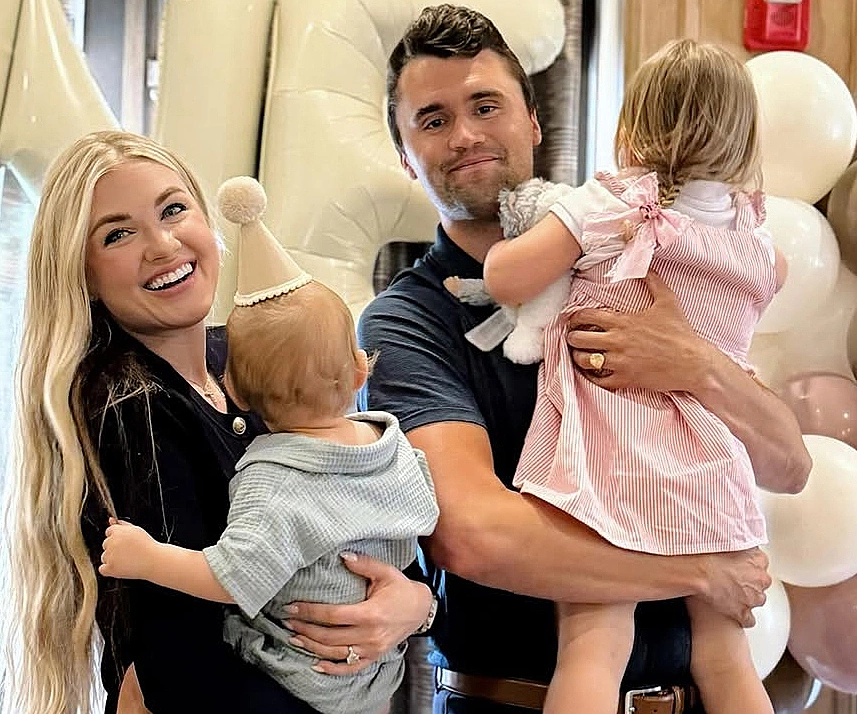America has witnessed countless moments of grief broadcast across television screens—flag-draped coffins returning from war, mothers wailing at vigils, families clutching faded photographs. Yet rarely has the nation been so collectively shaken as when Erika Lane Frantzve, the widow of slain conservative leader Charlie Kirk, revealed her pregnancy while breaking down in tears. Her desperate words, “WHAT SHOULD I DO?” pierced through political divides and landed like a dagger in the conscience of the nation. Suddenly, the tragedy was no longer just about a man’s violent death. It became about life, about legacy, and about a woman caught between the unbearable weight of loss and the fragile hope of new beginnings.
A Private Grief Forced Into Public View
Erika’s announcement was not delivered from a political stage but from a place of raw humanity. The widow, who had often been seen at Kirk’s side during public rallies and Turning Point USA events, appeared fragile, her eyes swollen with sleepless grief. What began as a solemn remembrance of her husband’s life became a moment of unfiltered devastation when she revealed she was carrying his child.

The cameras caught everything—the quiver of her voice, the tremble of her hands as she instinctively held her stomach, and the moment she broke down entirely. “How can I do this without him? What should I do?” she sobbed, collapsing into the arms of her family.
The image was instantly broadcast across networks and social media, sparking an avalanche of emotional reactions. Supporters rushed to offer words of encouragement: “You are not alone, Erika. America will help you raise this child.” Others expressed fury at the climate of violence that had stolen Kirk’s life and now left his widow in this cruel predicament. The moment blurred the line between personal grief and public reckoning.
The Duality of Death and Life
At the heart of Erika’s confession lies a cruel paradox: she is preparing to bring new life into the world even as she mourns the death of her husband. That duality has long haunted widows of public figures—from Jacqueline Kennedy carrying the grief of President John F. Kennedy while raising two children in the White House, to Coretta Scott King nurturing her young family after Martin Luther King Jr.’s assassination while carrying his legacy into the civil rights movement.
For Erika, the weight is no less crushing. She must prepare for baby showers and cribs while simultaneously planning memorials and enduring court proceedings against her husband’s alleged killer. This cruel intersection—mourning death while anticipating life—turns every simple decision into a battlefield of emotions. A family friend summed it up bluntly: “She has to shop for baby clothes while still choosing her husband’s gravestone.”

A Nation Searching for Meaning
The sheer emotional weight of Erika’s breakdown has made her unborn child a powerful national symbol. To many, the pregnancy represents hope—a continuation of Charlie Kirk’s life, a chance for his voice to echo in the next generation. To others, it represents tragedy: a baby born into grief, carrying a legacy of loss before drawing their first breath.
Political commentators immediately seized on this symbolism. One analyst noted: “Her child has become more than just a child. It is now a vessel of history, of unresolved political wounds, of legacy. Every step Erika takes will be scrutinized because the nation now sees her not just as a grieving widow, but as the guardian of Charlie Kirk’s unfinished mission.”
This burden is both unfair and unavoidable. In American history, widows of public figures often face a choice: retreat into privacy or step into the spotlight, willingly or unwillingly, to carry forward their late partner’s ideals.
The Psychological Toll
Beyond politics, Erika’s cry of “WHAT SHOULD I DO?” revealed a deeper human struggle: the collision of grief and impending motherhood. Psychologists note that pregnancy is already one of the most emotionally complex periods in a woman’s life. When compounded by trauma, it can lead to profound psychological strain—ranging from depression to heightened anxiety about the future.
“She is simultaneously carrying two realities,” one trauma specialist explained. “On one hand, the devastating loss of her life partner; on the other, the fragile hope of a child who represents both him and her. This is not simply grief—it is grief multiplied by the responsibility of motherhood.”
The nation, watching her collapse in real time, was forced to confront this unbearable duality. Her vulnerability broke through political rhetoric, reminding Americans that behind every headline is a beating heart struggling to survive the unthinkable.

The Politics of Violence
Charlie Kirk’s death itself remains a lightning rod of controversy. His assassination during a lecture at the University of Utah has fueled fierce debates about political extremism, free speech, and the state of security in American public life. For his supporters, he was silenced for speaking uncomfortable truths. For critics, his rhetoric made him a polarizing figure.
But for Erika, and now for her unborn child, the politics matter far less than the personal cost. The very existence of her pregnancy reframes the narrative: this was not just the loss of a political leader, but the collapse of a family, the extinguishing of a husband and father-to-be. It is a reminder that beyond the debates and headlines, political violence leaves scars that ripple for generations.
A Widow’s Burden
History shows that widows of slain figures often find themselves unwilling symbols of endurance. Jackie Kennedy, standing stoic beside her husband’s casket. Coretta Scott King, transforming her grief into activism. Even more recently, Gabrielle Giffords—though not a widow—became a living testament to resilience after surviving an assassination attempt.
Will Erika Lane Frantzve follow this path? Or will she retreat into private life, shielding her child from the relentless gaze of the public? Already, speculation abounds. Some believe she may eventually assume a more public role, keeping her husband’s vision alive. Others hope she will prioritize her own healing and the safety of her child.
Either way, her every move will be interpreted as symbolic, whether she wishes it or not.
The Unanswered Question
What made Erika’s sobbing plea—“WHAT SHOULD I DO?”—so haunting was that it did not feel rhetorical. It was a genuine cry for help, one that resonated across living rooms and phone screens nationwide. And in that moment, it seemed as if America itself was asking the same question.

What should we do, as a society, when political violence leaves families shattered? What should we do when the cost of rhetoric and division is measured not in polls or headlines, but in widows’ tears and fatherless children?
Her cry became a mirror, forcing the nation to look at itself.
Hope or Haunting?
As the weeks unfold, Erika’s pregnancy will remain under the nation’s gaze. Supporters will rally around her, adversaries may still politicize her husband’s death, and the media will continue to frame her every word as symbolic of something larger. But beneath all the noise, a woman is simply trying to survive—clutching the memory of the man she loved while preparing for the arrival of a child he will never meet.
Will the child represent hope, proof that life can grow even in the ashes of violence? Or will they grow up haunted by the weight of their father’s absence, their very existence tied to a national tragedy?
No one knows.
But one truth lingers: when Erika sobbed those words, it was not just a widow’s cry. It was America’s.
And as the cameras cut and the room fell silent, the nation was left with a single, haunting question—is this just the end of one life, or the beginning of a story too painful, too profound, and too unfinished for us to yet comprehend?